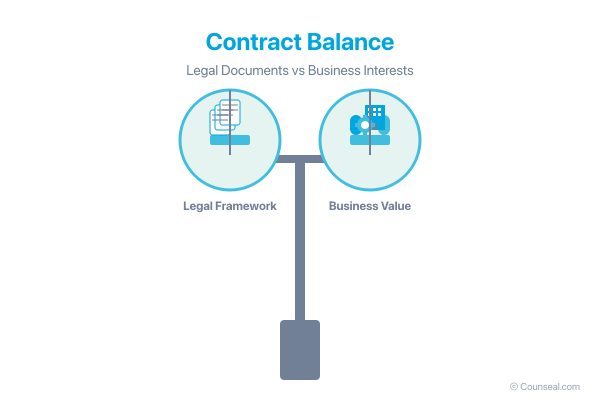The Essential Elements of a Valid Contract in Nigeria

by Counseal Team
Updated May 28, 2025

Understanding contracts is fundamental to conducting business in Nigeria’s dynamic commercial environment. Contracts serve as the foundation of all business transactions, establishing clear expectations and legal protections for all parties involved. Without properly structured agreements, businesses operate without essential safeguards, exposing themselves to significant financial and legal risks.
- Overview of Contracts in Business Transactions
- Legal Framework Governing Contracts in Nigeria
- Distinguishing Valid, Void, and Voidable Contracts
- The Essential Elements of a Valid Contract in Nigeria
- Additional Considerations for Nigerian Entrepreneurs
- Essential Contract Clauses for Business Protection
- Practical Implementation Strategies
- Strategic Contract Management
- Conclusion
Overview of Contracts in Business Transactions
Understanding contracts is fundamental to conducting business in Nigeria’s dynamic commercial environment. Contracts serve as the foundation of all business transactions, establishing clear expectations and legal protections for all parties involved. Without properly structured agreements, businesses operate without essential safeguards, exposing themselves to significant financial and legal risks.
The Critical Importance of Valid Contracts in Nigerian Business
Valid contracts are not merely recommended practice in Nigeria—they are essential for business protection and growth. Consider a scenario where you negotiate a supply agreement for 1,000 units of your best-selling product. Without a legally binding contract, you rely entirely on goodwill and verbal promises, which provide no legal recourse if disputes arise.
A properly drafted contract protects your business interests, establishes clear performance standards, and provides enforceable legal remedies when terms are breached. This protection is particularly vital in Nigeria’s evolving regulatory environment, where contract enforcement mechanisms continue to develop.

Legal Framework Governing Contracts in Nigeria
Nigerian contract law operates within a comprehensive legal framework combining statutory provisions, common law principles, and judicial precedents. The foundation rests on established common law principles adapted to local circumstances, with specific statutory modifications addressing unique Nigerian commercial realities.
This framework ensures contracts meet international standards whilst addressing local business practices and regulatory requirements. Understanding this legal foundation empowers businesses to create enforceable agreements that withstand judicial scrutiny.
Common Contract Misconceptions in Nigerian Business
Several persistent misconceptions can compromise contract validity and enforceability:
Complexity Equals Validity: Many believe contracts must be lengthy and filled with legal terminology to be enforceable. In reality, contracts can be concise and straightforward whilst maintaining full legal effect, provided they contain all essential elements.
Verbal Agreements Suffice: Whilst verbal contracts can be legally binding, proving their terms and existence in court presents significant challenges. Written agreements provide indisputable evidence of agreed terms and conditions.
Handshake Deals Are Adequate: Informal agreements may work for simple transactions but lack the precision and enforceability required for complex business relationships.
Definition of a Contract Under Nigerian Law
Under Nigerian law, a contract is a legally enforceable agreement between two or more parties that creates mutual obligations. For enforceability, contracts must contain specific essential elements: offer, acceptance, consideration, capacity, and legality of purpose.
Consider launching a new business venture with a partner. Verbal agreements about profit-sharing and responsibilities may seem sufficient initially, but without a written contract containing all essential elements, enforcement becomes problematic if disputes arise.
Distinguishing Valid, Void, and Voidable Contracts
Understanding contract classifications is crucial for Nigerian entrepreneurs:
Valid Contracts meet all legal requirements and are fully enforceable in court. They function like well-maintained machinery—reliable and effective.
Void Contracts lack essential elements or involve illegal activities, rendering them unenforceable from inception. They resemble vehicles without engines—impressive externally but fundamentally non-functional.
Voidable Contracts are initially valid but may be cancelled by one party due to circumstances such as misrepresentation, undue influence, or lack of capacity. These contracts remain valid until formally rescinded by the affected party.
Get Expert Guidance on Your Nigerian Business Journey
Join 1000+ entrepreneurs who’ve transformed their Nigerian business plans with our strategic guidance. In one focused session, unlock:
- Market-ready opportunity assessment
- Regulatory compliance roadmap
- Implementation strategy tailored to your business
- Cost framework and resource planning
What You’ll Receive:
- Personalized Strategy Session with a Nigerian market specialist
- Custom Implementation Roadmap based on your specific business goals
- Regulatory Checklist tailored to your industry
- Priority Access to our implementation team when you’re ready
How It Works:
- Select your preferred time slot below
- Complete a brief business assessment
- Join your private Zoom session
- Receive your actionable implementation plan
Limited availability — Only 8 sessions offered each week
The Essential Elements of a Valid Contract in Nigeria
Offer and Acceptance: The Foundation of Agreement
Every valid contract begins with a clear offer and corresponding acceptance. An offer represents one party’s willingness to enter into contractual relations on specified terms. Acceptance constitutes the other party’s unqualified agreement to those exact terms.
The offer must be definite, communicated to the intended party, and remain open for acceptance. Acceptance must mirror the offer precisely—any modifications constitute a counter-offer rather than acceptance.
Legal Requirements for Acceptance
Acceptance must be communicated effectively and may be either express or implied:
Express Acceptance: Direct communication through written or verbal confirmation. Examples include signing documents, stating “I agree,” or responding affirmatively to offers.
Implied Acceptance: Demonstrated through conduct consistent with agreement terms. Beginning work under proposed contract terms may constitute implied acceptance, even without explicit verbal or written confirmation.
Communication of acceptance must be clear and unambiguous. Nigerian courts require acceptance to be communicated in a manner the offeror can reasonably understand and recognise.
Practical Example: Business Partnership Agreement
When forming a business partnership, one party might propose specific profit-sharing arrangements (60/40 split). The other party’s clear agreement to these exact terms constitutes acceptance, forming the basis for their partnership contract.
However, if the responding party suggests alternative arrangements (55/45 split), this constitutes a counter-offer rather than acceptance, requiring further negotiation before contract formation.
The Role of Consideration in Contract Formation
Consideration represents the value exchanged between contracting parties—the reason each party enters the agreement. Without consideration, agreements lack the reciprocal obligations necessary for enforceability.
Forms of Consideration in Nigerian Contracts
Consideration can take multiple forms:
Monetary Consideration: Cash payments, loans, or financial commitments represent the most straightforward consideration type.
Services: Professional services, labour, or expertise provided in exchange for other benefits constitute valid consideration.
Goods: Tangible items, products, or materials transferred between parties serve as consideration.
Promises: Commitments to perform future actions or provide future benefits, provided they are specific and legally enforceable.
Practical Example: Supplier-Retailer Agreement
A palm oil supplier agrees to deliver 100 litres monthly to a retailer, who commits to paying N200,000 monthly. The palm oil represents the supplier’s consideration, whilst the payment constitutes the retailer’s consideration. This mutual exchange of value makes their agreement legally binding and enforceable.
Legal Capacity: Who Can Enter Contracts
Not everyone possesses the legal capacity to enter binding contracts. Nigerian law establishes specific requirements for contractual capacity.
Age and Mental Capacity Requirements
Legal Age: Individuals must be at least 18 years old to enter binding contracts independently. Minors (under 18) have limited contractual capacity, and their agreements are generally voidable.
Mental Capacity: Parties must possess the mental faculties to understand contract terms and implications. Individuals with impaired mental capacity due to illness, intoxication, or other factors may lack contractual capacity.
Contracts with Minors or Individuals with Diminished Capacity
Contracts with minors are typically voidable at the minor’s option, meaning the minor can choose to honour or cancel the agreement without legal penalty. This protection prevents exploitation of young people’s inexperience.
Similarly, contracts with individuals lacking mental capacity may be void or voidable, depending on the extent of incapacity and circumstances surrounding agreement formation.
Legality of Purpose: Ensuring Enforceable Agreements
Contracts must involve legal activities and comply with Nigerian laws and public policy. Agreements involving illegal activities, fraud, or actions contrary to public interest are unenforceable.
Examples of Illegal Contracts
Contracts involving the following are typically unenforceable:
- Bribery or corruption
- Unlicensed business activities
- Fraud or misrepresentation
- Activities violating Nigerian criminal law
- Agreements contrary to public policy
Case Study: Unregistered Business Contract Risks
A business owner attempted to enforce a contract with an unregistered company promising exceptional investment returns. When disputes arose, the court ruled the contract unenforceable because the other party lacked legal status to conduct business operations.
This case highlights the importance of verifying the legal status of contracting parties and ensuring all activities comply with Nigerian business registration requirements.
Free Consent: Ensuring Genuine Agreement
Free consent requires that all parties agree to contract terms voluntarily, without coercion, fraud, undue influence, or misrepresentation. Compromised consent can render contracts voidable.
Factors Affecting Free Consent
Coercion: Using threats or pressure to force agreement. This includes physical threats, economic pressure, or threats to reputation or business relationships.
Fraud: Deliberate misrepresentation of facts to induce agreement. False statements about product quality, financial status, or other material facts constitute fraud.
Undue Influence: Exploiting positions of trust or authority to secure unfair advantages. This often occurs in relationships involving significant power imbalances.
Misrepresentation: False statements that influence the other party’s decision to enter the contract, even without deliberate intent to deceive.
Legal Precedent: Ogunleye v. Adebayo
In this landmark case, the court ruled that contracts entered under coercion are voidable at the affected party’s option. The ruling established that genuine consent is fundamental to contract validity and that agreements obtained through pressure or threats cannot be enforced.
This precedent strengthens protection for Nigerian businesses against contract coercion and provides legal recourse for those pressured into unfair agreements.
Additional Considerations for Nigerian Entrepreneurs
The Superiority of Written Contracts
Written contracts provide numerous advantages over verbal agreements:
Evidence: Written documents provide clear evidence of agreed terms, reducing disputes and misunderstandings.
Precision: Written agreements allow detailed specification of obligations, timelines, and performance standards.
Enforceability: Courts more readily enforce written contracts due to clear documentation of terms.
Professional Standards: Written contracts demonstrate professionalism and serious business intent.
Contract Enforcement Challenges in Nigeria
Nigerian contract enforcement faces several practical challenges:
Court Delays: Commercial dispute resolution through Nigerian courts averages 454 days, according to World Bank data.
Enforcement Mechanisms: Limited enforcement resources can delay judgment execution.
Alternative Dispute Resolution: Arbitration and mediation offer faster, more efficient alternatives to traditional litigation.
Proactive businesses address these challenges by including alternative dispute resolution clauses and working with experienced legal professionals familiar with Nigerian enforcement procedures.
The Value of Professional Legal Support
Legal professionals provide essential services in contract drafting and review:
Risk Identification: Experienced lawyers identify potential problems before they become costly disputes.
Compliance Assurance: Legal professionals ensure contracts comply with current Nigerian laws and regulations.
Drafting Precision: Professional drafting reduces ambiguity and enhances enforceability.
Strategic Advice: Lawyers provide strategic guidance on contract structure and negotiation approaches.
Essential Contract Clauses for Business Protection
Critical Protective Clauses
Party Identification: Clearly identify all contracting parties with full legal names, addresses, and business registration details.
Scope of Work: Define obligations, deliverables, and performance standards with specific detail to prevent scope creep and disputes.
Payment Terms: Specify amounts, currencies, payment schedules, and methods. Include consequences for late payment and dispute resolution procedures.
Confidentiality Provisions: Protect sensitive business information, trade secrets, and proprietary data shared during contract performance.
Termination Conditions: Establish clear grounds for contract termination, notice requirements, and post-termination obligations.
Advanced Protective Measures
Force Majeure Clauses: Address unforeseeable circumstances that might prevent contract performance, particularly relevant given Nigeria’s challenging infrastructure environment.
Governing Law and Jurisdiction: Specify which laws govern the contract and which courts have jurisdiction over disputes.
Intellectual Property Protection: Clarify ownership of intellectual property created during contract performance.
Practical Implementation Strategies
Contract Template vs. Custom Agreement Analysis
Contract Templates:
- Cost-effective for standard transactions
- Faster implementation for routine agreements
- May lack specificity for unique business needs
- Risk of inadequate protection for complex arrangements
Custom Agreements:
- Tailored protection for specific business requirements
- Higher upfront costs but better long-term protection
- Address unique risks and opportunities
- Require professional legal drafting
Pre-Signature Legal Review Protocol
Before signing any significant contract:
- Comprehensive Review: Examine all terms, conditions, and implications
- Legal Consultation: Engage qualified Nigerian legal professionals
- Risk Assessment: Identify potential problems and mitigation strategies
- Negotiation Strategy: Develop approaches for improving unfavourable terms
- Documentation: Ensure all agreed modifications are properly documented
Vendor Agreement Best Practices
When evaluating vendor agreements:
Due Diligence: Verify vendor registration, financial stability, and reputation Performance Standards: Establish measurable quality and delivery requirements Payment Protection: Structure payments to incentivise performance and protect against default Compliance Verification: Ensure vendor compliance with Nigerian business regulations
Strategic Contract Management
Ongoing Contract Administration
Effective contract management extends beyond initial drafting and signature:
Performance Monitoring: Regularly assess whether all parties meet their obligations Amendment Procedures: Establish processes for modifying agreements as circumstances change Documentation: Maintain comprehensive records of all contract-related communications and modifications Relationship Management: Use contracts as tools for building positive business relationships rather than merely legal protection
Dispute Prevention Strategies
Clear Communication: Establish regular communication protocols to address issues before they become disputes Performance Reviews: Conduct periodic assessments of contract performance with all parties Early Warning Systems: Create mechanisms to identify potential problems early Collaborative Problem-Solving: Develop approaches for resolving issues cooperatively
Conclusion
Key Takeaways for Nigerian Entrepreneurs
Understanding the essential elements of valid contracts—offer, acceptance, consideration, capacity, legality, and free consent—provides the foundation for successful business relationships in Nigeria. These elements work together to create enforceable agreements that protect your interests whilst fostering productive commercial partnerships.
The Strategic Value of Contract Compliance
Legal compliance in contract formation and management represents a strategic investment in business stability and growth. Properly structured contracts reduce legal risks, enhance business credibility, and provide clear frameworks for successful commercial relationships.
Moving Forward with Confidence
Mastering contract fundamentals enables Nigerian entrepreneurs to engage confidently in complex business transactions. By combining understanding of essential elements with professional legal support, businesses can create robust agreements that support growth whilst minimising legal exposure.
The investment in proper contract development and management pays dividends through reduced disputes, stronger business relationships, and enhanced commercial opportunities. As Nigeria’s business environment continues to evolve, those who master contract fundamentals will be best positioned for sustainable success.Ready to ensure your business contracts provide maximum protection? Start your free strategy session today to review your current agreements and identify opportunities for improved legal protection.





